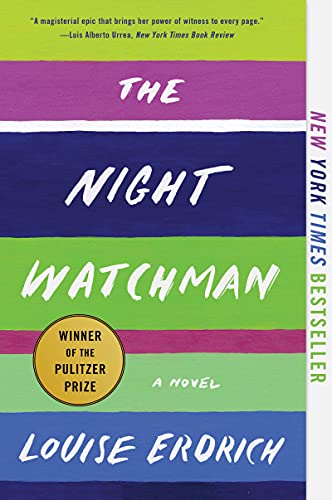Alright, folks, grab your midnight snacks and put your feet up—I’ve got a review for you! This time, I’m talking about Louise Erdrich’s slice-of-life wonder, The Night Watchman. After reading this with my book-loving pals (and arguing over snacks), I can say there’s plenty to love and a few quirks to squint at. I’ll cover the good, the not-so-good, and tell you if this book is worth keeping on your nightstand or, well, under it. Spoiler alert: there’s more heart and wit in here than in my last family poker night (and less cheating, hopefully).
In a nutshell
Louise Erdrich’s The Night Watchman is a historical fiction novel with a good bit of heart and humor. It’s inspired by her own grandfather’s life, so you know you’re not getting just another made-up story. The whole thing is set in 1950s North Dakota, where the U.S. government is basically trying to erase Native tribes off the map (not cool, by the way).
We follow Thomas, a Chippewa night watchman who keeps himself awake with coffee, strong opinions, and a big worry: will his people lose their land and rights? Alongside him, we meet Patrice, a young woman hunting for her missing sister, which leads to all sorts of trouble. The book’s got family, identity, and standing up for what you believe in—even if you’re working the night shift.
Erdrich mixes humor and tough moments, making it more than just a sad story. You’ll learn stuff about Native history, but you’ll also laugh (and maybe cry) at the folksy wisdom and weird snacks people eat at midnight. If you like stories about strong families, fighting the odds, and some good old-fashioned stubbornness, this one’s for you.
Uncovering Chippewa History Through the Eyes of a Night Watchman
Let’s talk about Louise Erdrich’s “The Night Watchman”, a book that does more than just tell a story. It takes you back in time and shows you a world based on real-life Chippewa history. This is not your average history class, with dusty facts and a monotone teacher – this is living, breathing history, wrapped up in the life of one very quiet, very steady, night watchman named Thomas.
Now, Thomas is not just any fellow who checks doors and sneaks coffee at 2 a.m. He’s based on the author’s own grandfather, and boy, does it show. The book paints Thomas as a humble hero, trying to protect his tribe’s rights when the government wants to take their land away. No fancy speeches or superhero costumes. Just a man, a clock, and a determination you could build a house on.
Reading about Chippewa’s struggle through Thomas’ eyes, I felt like I’d been handed a key to a story nobody bothered telling me before. It’s rich, it’s important, and it’s told with honesty. Erdrich doesn’t sugarcoat the struggles. Sometimes, the mood gets heavy. But there are sparkles of humor—like when Thomas tries to explain night watchman life to his curious family, and they think he just naps under his desk all night (which, let’s be honest, is something I would totally do).
The way the history sneaks into every bit of the story? That’s the magic. But I’ll save my best compliments for the next page, because if you thought Chippewa history was interesting, wait till you meet the people living inside this book. Next up: Complex and memorable character development, because these folks do not stay flat on the page!
Complex and Memorable Character Development in ‘The Night Watchman’
If you want to meet a cast of folks who stick with you like the smell of burnt popcorn, Louise Erdrich’s The Night Watchman is where it’s at. I’m not saying I tried to invite them to my birthday party, but if I could, I would have. The characters in this book feel so real I half expected Thomas, the night watchman himself, to turn up in my living room and ask if I’d seen his punch card.
Seriously, Thomas is not your everyday hero. He’s based on Erdrich’s own grandpa, and it shows. He’s flawed, but he’s got grit. He cares about his family and his tribe, and when the U.S. government tries to take their land, he doesn’t just lay down and take it. He works a boring job at night, but his mind is always busy, thinking about solutions, his loved ones, and biscuits (okay, maybe not the biscuits—but I was hungry when I read this part!).
The other characters are just as sharp. Patrice, also called Pixie, is fierce and stubborn, but you’d be too if you grew up with a family like hers. She’s got determination you could use as a hammer. Even side characters don’t fade into the wallpaper. They have problems, quirks, and ideas of their own. Erdrich paints everyone with honesty, letting you see their cracks and kindness both. I started rooting for them like they were my bowling team.
Next up, grab your tissue box and your detective hat, because we’re about to explore the big themes of family, identity, and resilience that make this story hit home harder than a moose in a canoe race!
Themes of Family, Identity, and Resilience in The Night Watchman
Let’s be honest, a good book is like a warm blanket and The Night Watchman by Louise Erdrich is stitched together with family, identity, and resilience. This story follows Thomas Wazhushk, the title’s night watchman, who keeps not just a factory safe, but also tries to protect his whole community. Every shift he works, every zigzag thought he has, is a shout out to the power of family bonds. And, let’s face it, he has more family members than I have pairs of socks. Families in this story aren’t perfect—sometimes they bicker and make soup with questionable leftovers—but they hold together when it matters.
If I had a dollar for every time someone in this book questioned who they were or where they belonged, I’d buy a new lamp for my reading nook. Identity in Thomas’s world is not just about names or jobs, but about traditions, language, and fighting for the right to exist. The characters wrestle with their sense of self in a world that seems intent on changing them. This isn’t just deep stuff—it’s relatable. Who hasn’t wondered where they fit in, especially when the world feels upside down?
Now, let’s talk resilience. Every time the community gets pushed down (by the government, by life, or by a winter colder than my ex’s heart), they get back up. Thomas, especially, keeps showing up, floppy lunchbox and all, to stand guard for his family and his people. If resilience was a sport, these folks would be Olympic gold medalists.
And speaking of medals, next, I’ll talk about Erdrich’s writing style, which swings between wit, emotion, and energy faster than you can say “plot twist.”
Wit, Emotion, and Pacing: Erdrich’s Writing Style Shines Like a Really Good Flashlight
If you handed me a book and said, “Steve, it’s about a night watchman,” I would think, “Great, it’s going to be slow and full of people falling asleep on the job.” Oh, how wrong I would be! Louise Erdrich keeps things moving faster than my uncle Larry running from a bee. I actually found myself staying up way past my bedtime (which I like to claim is midnight, but really it’s 10:30) because I kept thinking, “One more chapter.” The pacing works so well, you don’t even notice it, like when you eat a whole bag of chips and only realize when you hit the bottom.
Erdrich’s wit sneaks up on you. It’s not slapstick, but she peppers in sharp humor—sometimes in the middle of sad or tense moments. It made me chuckle and even snort-laugh once, which got me weird looks from my cat. I love a book that can make me grin in dark times, kind of like finding five bucks in your winter coat.
But—and here’s where Erdrich really shines—her emotion hits hard. She doesn’t throw buckets of sadness at you, but instead, little drops that add up. I started to care about the characters without even realizing it. There’s one scene with Thomas, the night watchman himself, where his worries feel like your own. It’s as real as bread that’s too fresh for toasting.
Would I recommend The Night Watchman? Absolutely. It’s got heart, smarts, and enough action to keep even an easily distracted Steve locked in. Just keep tissues and snacks nearby—you’ll need both.
Conclusion
Well folks, that’s a wrap for my review of The Night Watchman. This book gave me laughs, tears, and a couple late-night snack attacks because I couldn’t put it down. Erdrich does a great job mixing serious stuff like family and identity with humor and warmth. Sure, there were a few slow parts where my mind wandered, but the strong characters and clever writing hooked me back in. If you like historical fiction with heart and a sprinkling of wit, this one is worth your time (and your bookmarks). Thanks for sticking around—review over, snacks eaten, Steve out!



